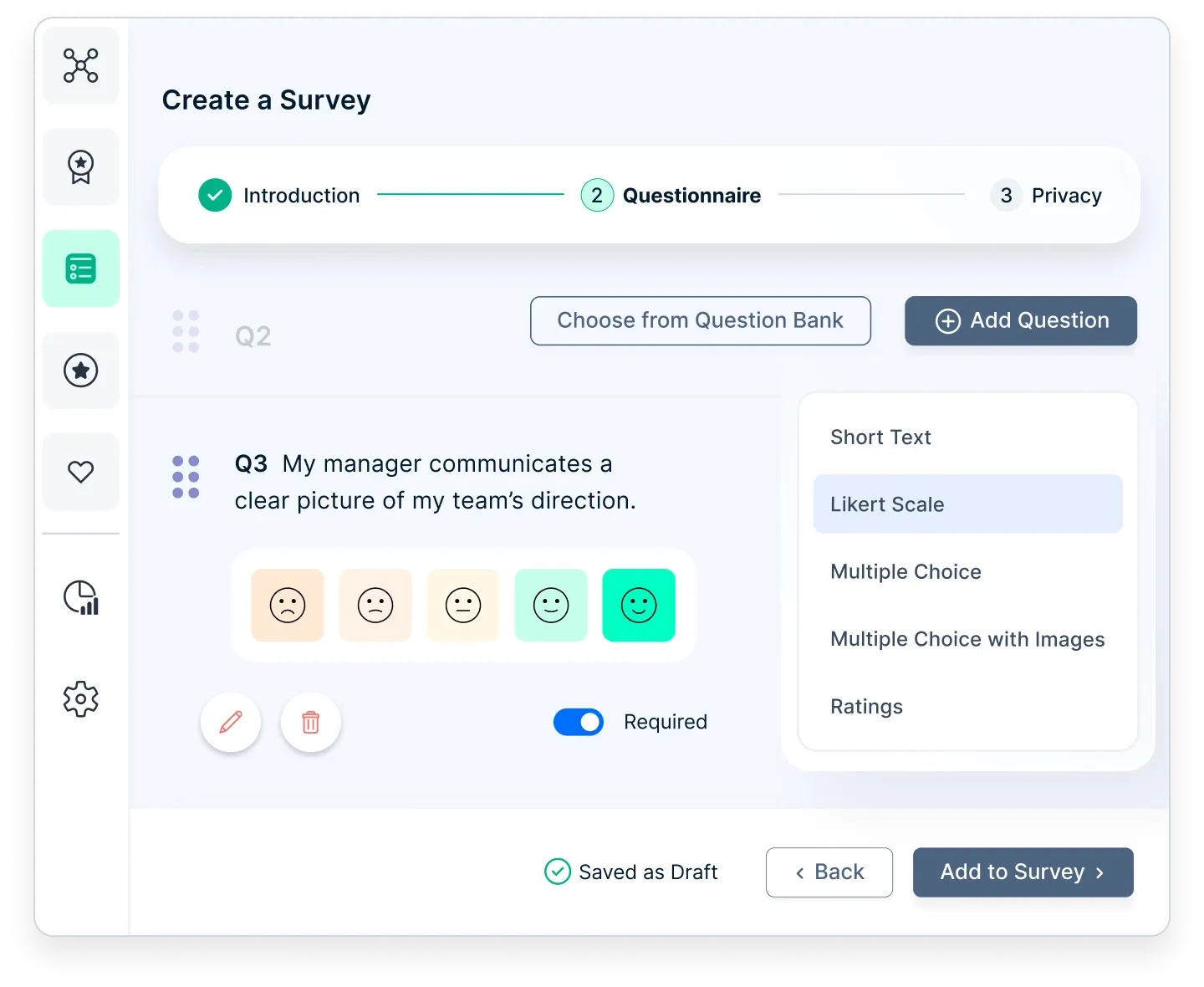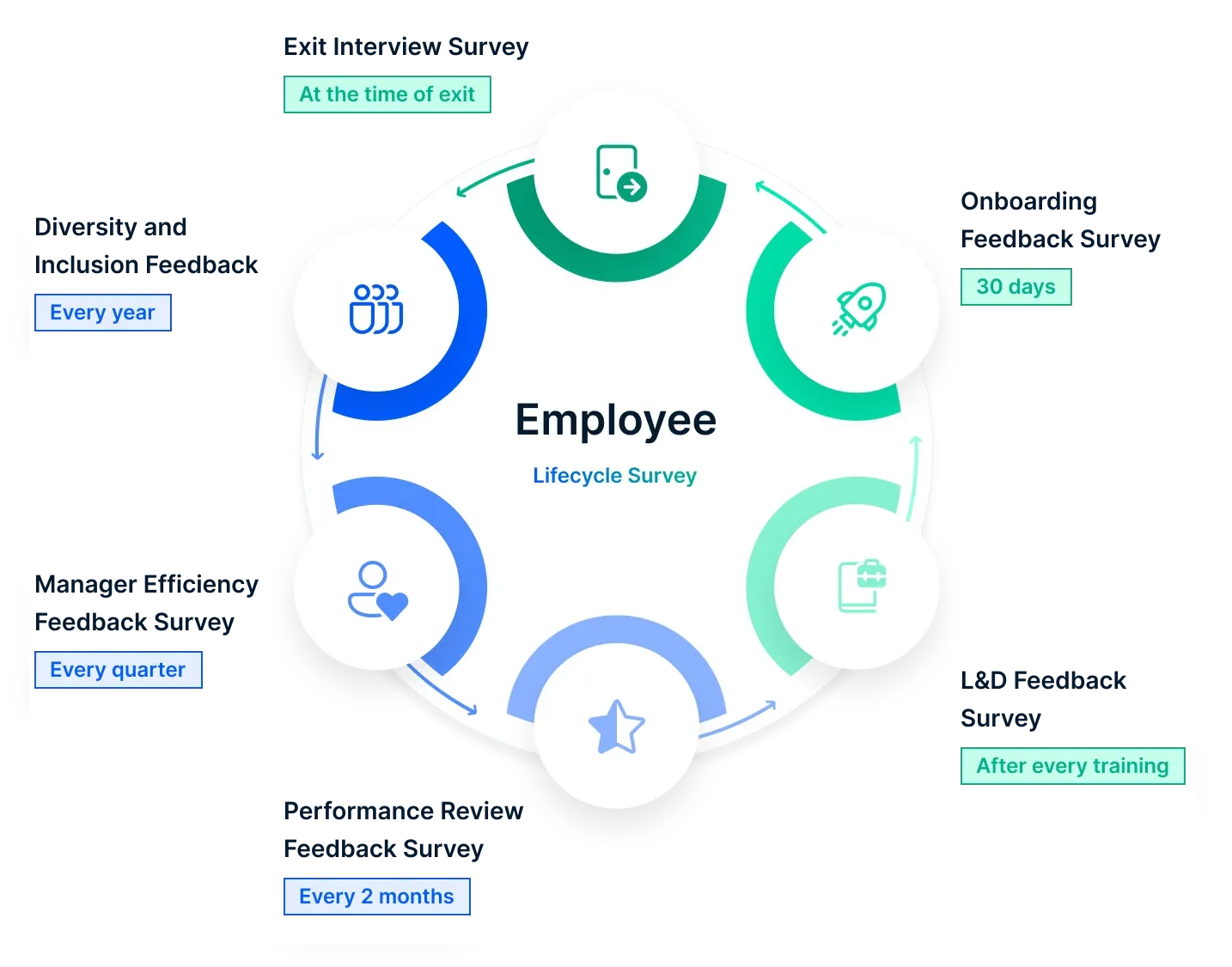Employee Exit Survey: How to Gather Insights & Improve Retention
An employee exit survey helps uncover why employees leave, providing insights to improve retention, workplace culture, and employee experience.
On this page
- What is an employee exit survey?
- 4 Reasons you should use employee exit surveys
- How to create an exit survey
- How to conduct an employee exit survey: 5 Best methods
- How to summarize the findings of exit interviews to improve performance
- Exit interview questions HRs should ask employees
- How can exit interviews affect the retention of employees
- How to benefit from employee exit surveys
- Improve employee retention with the Empuls exit survey software
- Key points to take away
Collecting honest feedback and getting the best insights is essential most of the time to notice various perspectives. One of the critical situations in which you may need the best insights is resignations.
Many employees leave their companies for many reasons, such as company culture, insufficient wages, work environment, working hours, and workload. Employers should investigate these reasons and make the necessary changes according to the feedback if the company needs it.
There are various ways to collect constructive feedback from employees who resign. The most common way to do it is to conduct exit surveys.
Exit surveys are preferred because they can be created online and filled out quickly via mobile applications. In this article, you will learn methods, questions, and reasons to obtain the best insights in your surveys in a detailed way.
What is an employee exit survey?
An employee exit survey is a structured questionnaire given to departing employees to understand their reasons for leaving, gather feedback on their work experience, and identify areas for improvement within the organization.
Unlike exit interviews, which can sometimes lead to guarded responses, exit surveys provide employees with a confidential platform to share honest insights about management, workplace culture, compensation, career growth, and job satisfaction.
Leaders can create a better company culture when employees express their opinions about why they are leaving the organization.
The responses to the exit surveys show more clearly where the company has shortcomings. For this reason, the reactions should be noted and analyzed to improve employee engagement and retention. So companies can make the necessary moves to correct their shortcomings.
4 Reasons you should use employee exit surveys
You may wonder what other benefits exit interview surveys can bring to work culture and companies. In many ways, these surveys give your company a new perspective, and you become a company where employees compete to work with you.
1. Gain useful feedback
With the feedback and various ideas you get, you can bring new perspectives to the HR department and make existing employees more satisfied. This feedback is usually about situations that employees are uncomfortable with.
Engaged employees will be more committed to their workplace. In addition, they will embrace workplace projects as their own.
2. Build stronger relationships
Even if employees resign, this does not mean they will never work in the same place again. They may not like their coworkers or, more importantly, their job at their new workplace, and they may want to work with you again.
For this reason, employee exit surveys can help you keep in touch with them and even build a stronger bond.
3. Discover the weak and strong points
Criticism is one of the best ways to detect your weak points to improve yourself. Companies and their management groups need to be open to both positive and negative criticism because only in this way can they discover their strengths and weaknesses.
If you do more activities to improve your weaknesses, you will automatically satisfy your new employees.
4. Avoid further churn
While many people can work for you, hiring a new employee for a company is an important and lengthy process. Both employees and employers need to trust each other mutually. Every employee who leaves is a waste of time and effort for the company, and proper communication with employees can help you avoid these losses.
How to create an exit survey
Creating an exit survey can be valuable for gathering feedback from individuals leaving your organization or program. The survey can help you identify areas for improvement and gain insights into why they departed.
Here's a step-by-step guide to help you create an effective exit survey:
1. Define your objectives
Determine the specific goals you want to achieve with the exit survey. For example, you should understand the reasons for employee turnover, identify areas of dissatisfaction, or gather suggestions for improvement.
2. Select the survey method
Decide on the format and delivery method for your survey. You can choose between online survey tools or paper-based surveys.
3. Choose the survey questions
Develop a set of questions that align with your objectives. Consider a mix of closed ended (multiple-choice or rating scale) and open-ended (free text) questions. Here are some common types of questions to include:
- Demographic information: Collect basic data such as job title, department, tenure, or reasons for leaving.
- Likert scale questions: Use rating scales to measure satisfaction levels, such as asking them to rate aspects of their job or the organization.
- Multiple-choice questions: Offer predefined options for respondents, such as asking about the primary reason for their departure.
- Open-ended questions: Provide space for respondents to provide detailed feedback, suggestions, or additional comments.
4. Ensure confidentiality and anonymity
Assure respondents that their answers will remain confidential and anonymous. This helps foster honest and unbiased responses.
5. Keep the survey concise
Respect the respondents' time by keeping the survey short and focused. Avoid unnecessary or repetitive questions.
6. Pilot test the survey
Before distributing the survey widely, conduct a pilot test with a small group of individuals who are leaving or have recently left. This will help you identify any issues or ambiguities in the survey and make necessary adjustments.
7. Distribute the survey
Once confident in the survey's design, distribute it to the intended audience. Send it via email, link to your organization's website, or distribute paper copies if necessary.
8. Set a deadline and send reminders
Communicate the deadline for survey completion and consider sending reminder emails to encourage participation.
9. Analyze the data
Once you've collected the responses, analyze the data to identify patterns, trends, and key insights. Look for common themes, recurring issues, and areas for improvement.
10. Take action
Use the insights from the exit survey to inform your decision-making and improve your organization or program. Implement changes based on feedback to address any identified issues or concerns.

Gain Actionable Insights with Empuls Employee Exit Surveys
Understand why employees leave and improve retention with Empuls’ employee exit surveys. Get honest feedback, identify workplace challenges, and make data-driven decisions to enhance employee experience. Ensure every departure leads to meaningful organizational growth.
How to conduct an employee exit survey: 5 Best methods
If the information you have read has made you realize how useful these surveys can be for your company and your employees, you are probably thinking about how to create them.
We have compiled three frequently used methods for you so that you will have an average knowledge of each one and can choose the best one for yourself.
1. Face-to-face
One of the most used ways to conduct an exit survey is face-to-face. The older and more traditional paper questionnaires are prepared by HR departments and are expected to be answered by employees who have declared their intention to resign.
You can ensure employees read the survey questions completely and answer them themselves. The downside is that the answers to these questions must be recorded and analyzed individually, which is a very long process.
2. Printed surveys
Printed surveys are another way to collect honest feedback from your employees. You can quickly print the surveys you create on the computer and then give them to those who resign from their jobs. This method is more costly and laborious than others.
Employees must also be physically present in the office to complete the printed questionnaires, which many people do not want to deal with.
3. Phone call
Surveying by phone call is also one of the methods used, although it is not very popular. The first reason for its unpopularity is the low response rate to these surveys.
According to Pew Research, the response rate to telephone surveys continues to decline. During phone calls, the person in charge reads the previously prepared text to the resigned employees and records their answers.
However, this method is a very tiring process for both parties. Misunderstandings and poor connections can also hurt the results of the survey.
4. Create a survey by writing code
Another well-known method is to write code to build an online exit survey. With this method, you can create a survey with your desired look. You need to know how to code or hire a program to do this.
The downsides of coding are that it is expensive and takes too long to create a survey. For this reason, although it is a well-known method, it is also a method that is no longer preferred.
5. Using survey maker tools
Another frequently preferred and popular method is online employee feedback and survey tools. One of the most preferred reasons is that online survey tools do not require coding knowledge, and surveys can be created online.
Moreover, many survey maker tools include exit survey templates, which makes your job even easier. Ready-made templates and themes will help you to create surveys in a minute.
How to summarize the findings of exit interviews to improve performance
You'll have a tone of helpful information in your possession after conducting an employee departure interview. One issue remains for you to consider after the departing employee has been subjected to all of those exit interview questions: What will I do with this information?
Too frequently, businesses file it away without acting on the new information. In reality, 37% of HR managers claim to utilize departure interview data seldom. #Stop allowing it to happen to you.
Here are some steps to summarize the findings of exit interviews:
1. Conduct exit interviews with leaving employees
When your employees inform the human resources department that they want to resign, you should send them the exit survey you prepared earlier. You can do this in the way you think will be most useful for you. For example, these can be online surveys or paper surveys.
Your exit survey should include engaging questions with a purpose similar to other HR survey questions. Employees should answer questions without wasting too much time after leaving their work. Otherwise, it can be challenging to get the most honest feedback.
2. Analyze the data to see if there is a shared pattern
The next and one of the most important steps is to analyze the answers. The first thing to look for when analyzing the answers is whether there are common answers. These shared patterns make it easier to identify your company's strengths and weaknesses.
You should especially note your weak points so that you don't face the same problems in the future. You should also record your employees' favorite features in your company so that you don't have to put effort into developing them further.
3. Compare exit interview results with the results of other surveys
Another way to analyze the survey results is to compare them with other employee surveys and forms. The general purpose of these surveys is to measure employee satisfaction with their work and to improve their performance. In all surveys, you can check whether employees answer the questions consistently.
If employees are dissatisfied with the same aspects across all surveys, the human resources department should prioritize improving them. This way, you can enhance your company culture and obtain more engaged employees.
4. Identify weak points and work on improving them
Another step is to identify and categorize weak points. Once you have categorized them, it will be easier to enhance them. For example, employee concerns can be related to work, work environment, company culture, economic reasons, or mobbing.
If a direct person is responsible for these problems, you should communicate this with them. If these problems are things that the company can improve and change, they should be given importance, and you should strive to implement these innovations.
5. Share your findings with executives to develop new policies
Your final step is to note all your analyses in detail and make an overall assessment. You should share all the results with your managers in your organization and think of new strategies to improve these shortcomings.
If you can turn all these shortcomings into strengths, you can make your company even more desirable from your employees' perspective.

Ready-to-Use Employee Survey Templates for Instant Insights
Save time and get the right feedback with Empuls’ employee survey templates. Choose from a variety of pre-designed surveys to measure engagement, satisfaction, and workplace culture—customizable for your organization’s needs.
Exit interview questions HRs should ask employees
If you want to create an exit survey from scratch and are unsure what questions to include, you should use the questions below.
Even if you don’t use the same questions below, you can take inspiration from them and develop more relevant questions for your own company.
General exit interview questions HRs should ask employees
The questions listed below are more generic exit interview questions. These inquiries may be asked during an exit interview regardless of the reasons for a candidate's departure from the organization. We will offer more detailed questions based on the kind of departure.
1. Why did you decide to leave [company]?
2. What prompted you to begin seeking for work elsewhere?
3. Was a specific event that made you leave your position? Then what?
4. What does your new job provide that your previous one does not?
5. Could anything has been done to keep you working for the company? Then what?
6. Did you consult with anyone before deciding to resign?
7. Would you come back to the company? Whether or not
8. Would others consider working for the company? Why not, then?
9. Have you ever experienced any form of bullying or harassment? If so, did you contact HR?
10. Throughout your job, did you experience engaging or encouraging leadership?
11. Did you have the right equipment, materials, and/or training to fulfill your role's requirements? What was lacking if not?
12. Do you have any suggestions for improving the organization's appeal?
13. Do you have any other comments to make?
14. Is it acceptable if a representative of our human resources division contacts you to inquire about anything further?
Exit interview questions to ask an employee when they retire
A bittersweet time is retirement. They are leaving the job they have known and loved, but it may also mean they will have more free time and opportunities for new experiences. You may learn more about a retiring employee's career path and future goals by asking them the following questions during an exit interview.
15. How do you feel about your professional development and achievements at the company?
16. What do you intend to do after you retire?
17. Do you believe you have enough money to support yourself in retirement?
18. Throughout your career, did the company give you enough training and support?
19. What might have been done to improve your experience or make it more successful?
20. Do you have any recommendations for the company's present or upcoming employees?
21. Do you have any suggestions for improving the company's perks or retirement plan?
22. Do you intend to continue working with the company in any capacity, such as through consulting or volunteering?
Exit interview questions for terminated employees
Even though termination is never a simple topic, exit interviews are crucial. There are situations when a separation can be amicable. It might not be at other times. The following questions can be used to learn how a fired employee feels about the company and, ideally, address any rules or practices that may have contributed to their termination.
23. Can you describe the circumstances that led to your termination?
24. Were there any red flags or warning signs before being fired?
25. Did you receive the assistance and instruction you need for your role before your employment was terminated?
26. Did you feel that the management valued your work?
Exit interview questions to ask employees when they resigns voluntarily
There are many different causes for voluntary resignations, from personal to professional. The following questions can be used in an exit interview with a departing employee to learn more about their time there and, ideally, to change any rules or practices that may have contributed to their choice to leave.
27. Why did you decide to leave your position?
28. Was there a way that the company may have stopped your resignation?
29. Did you believe that you were given the right instruction and assistance for your position?
30. Did poor communication with management or your coworkers influence your choice to quit?
31. Do you have any recommendations for enhancing the corporate culture or the workplace?
32. Would you suggest the company as a great place to work?
33. Would you like to add anything more regarding your time while working for the company or your resignation?
Exit interview questions to ask when an intern leaves the company
The success of the intern program and the degree to which interns were assimilated into the company may be learned through exit interviews with interns. The following questions can be asked of a departing intern during an exit interview to learn more about their time with the company and, perhaps, to enhance any rules or procedures for future intern recruits.
34. What would you say about your time as an intern at the company?
35. Did you believe that you were given the proper instruction and assistance for your position?
36. Did poor communication with management or coworkers contribute to your decision to leave the internship program?
37. Do you have any recommendations about how to make the intern program or the workplace for interns better?
38. Would you suggest the company to prospective interns looking for experience?
39. Do you have any further comments on your time as an intern at the company and/or your decision to leave the program?
40. Would you think your experience working for the organization as an intern was beneficial to your career and personal development?
41. Would you ever think about submitting an application for full-time employment with the company? If not, why not?
How can exit interviews affect the retention of employees
Employee retention is greatly influenced by employee engagement. However, departure interviews will only affect employee retention if the lessons learned are acted upon and applied to benefit the rest of your staff.
Approximately 85% of employees are thought to be disengaged at work. 1 Even while that number might be difficult to comprehend, there are still steps you can do to change the course of events.
The following three elements significantly impact employee engagement:
- The relationship between a supervisor and an employee
- An employee's confidence in the company's management
- An employee's sense of teamwork
Keep these in mind as you prepare for the departure interview and ask questions to discover how you may enhance relationships, trust, and pride in your company.
How to benefit from employee exit surveys
You may learn a lot from exit interviews. Don't waste the opportunity to learn by failing to use employee departure surveys. Employee surveys may be used at any time, not only when someone is leaving, but they are especially crucial when someone is about to leave. It's important to receive comments from others since, according to 71% of workers, it makes them more productive.
One of the last opportunities you have to hear from an employee before they leave your firm is when they are about to leave. Don't pass up the chance to learn from them; utilize constructive criticism to improve your team's workplace.
Remember that the main objective of departure interviews is to use the knowledge you gain to improve workplace culture for your current and future teams. Take advantage of every employee leaving to enhance your business.
Improve employee retention with the Empuls exit survey software
Losing employees is inevitable, but understanding why they leave can help organizations build a better workplace. Empuls’ employee exit survey software provides structured feedback to uncover key reasons for attrition, helping HR teams make informed decisions that improve retention.

🔹 Automated & customizable surveys: Make exit surveys effortlessly with pre-designed templates or create your own.
🔹 Confidential & honest feedback: Ensure departing employees feel safe sharing their experiences.
🔹 AI-driven analytics: Identify trends and recurring issues to address workplace concerns.
🔹 Easy integration: Conduct surveys seamlessly via Slack, Microsoft Teams, or email.
🔹 Actionable insights: Use real-time data to refine policies, improve engagement, and boost retention.
Don’t let valuable feedback walk out the door. With Empuls’ employee exit interview survey, turn departures into opportunities for workplace growth and improvement.
Key points to take away
Collecting honest feedback and asking employees for their opinions will help you improve your company. You can transform your company culture and working conditions so employers and employees can get maximum efficiency.
Exit surveys are one of the best ways to get the most honest feedback because a resigning employee can freely offer his or her opinions about coworkers and the work environment without hesitation.
To get the best results, face-to-face and online surveys built by survey-maker tools are the most practical and effective.
Moreover, with the ready-made templates offered by survey maker tools, you can create professional surveys in no time and ensure that employees can access these surveys from anywhere, thanks to the phone application. Start creating exit surveys to collect feedback without wasting time!


















